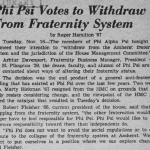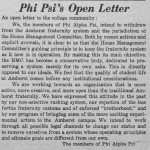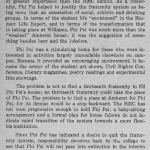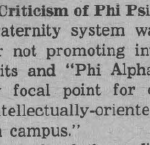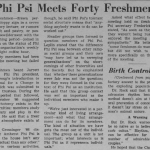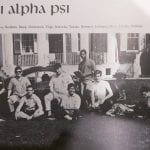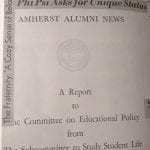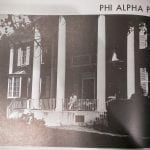Phi Alpha Psi (now Charles Drew House) was an oddity in the history of Amherst fraternities.
It harbored an odd collection of inhabitants: artists, hippies, political radicals, and those who preferred not to engage with the social shenanigans commonly associated with the other fraternities.
In the 1960s, it petitioned to withdraw from the fraternity system and the jurisdiction of the House Management Committee (HMC), because it sought to be “more active, more creative, and more open than the traditional Amherst fraternity.” The HMC resisted the change, which ultimately contributed to a build-up of anti-fraternity feelings among Phi Psi members.
Phi Psi distinguished itself from other fraternities because it:
- had a non-selective rushing system
- rejected “enforced brotherhood” and cultivated a tolerant social culture
- became a hub for a range of creative and intellectual activities: a center for “student art shows, Civil Rights Conference, literary magazines, poetry readings and experimental film showings.”
The decision to secede was for everybody’s benefits; other fraternities would not have to feel responsible for Phi Psi and vice versa, leading hopefully to co-existence in separate spheres. It wanted to transform a fraternity to more than just a cult for drinking, athletics, and social shenanigans.
But before Phi Psi successfully seceded, the fraternity council intended to whip it back into line by demanding that it create its own homecoming band and publication with its members’ tuition money. For the publication, Grossinger was drafted to be editor because of his writing experience, as well as the fact that he had already produced two (camp) newspapers. This floating directive came together with other factors (the Halloween speech, proposal for four-college publication, Robert Kelly’s encouragement) resulting in the creation of Io in early 1965.
This upheaval in Phi Psi’s status persisted throughout Io’s beginnings. With visits from experimental artists, poets, and film-makers thanks to Io, Phi Psi cemented itself as an outsider. For the 1966 yearbook, in place of a Phi Psi picture in the fraternity section, the Olio simply provided a collage stating that “Phi Psi Asks for Unique Status.”
RETURN to Of Moons and Serendipity
Overview of Literary Magazines
Of Moons and Serendipity: the conception
Inside Io: mission statement, Io-1
Eyes on Io: the reception
Io after Amherst: post-Amherst transformation
Bibliography
Project by Phuong-Nghi Pham ’18
